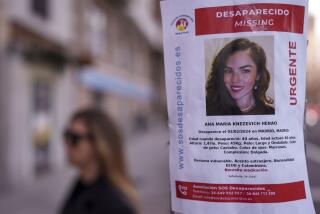Nureyev Was Subject of FBI Spy Probe
- Share via
Rudolf Nureyev a Soviet spy? Such a notion seems incredible to friends and admirers of the legendary ballet dancer, known for his rebellious nature, who was denounced by the Kremlin as a traitor after his 1961 defection.
But the FBI took it seriously enough in 1964 to open an espionage investigation into Nureyev, according to recently declassified documents.
Nureyev biographer Diane Solway describes the investigation as a “Keystone Kops affair” that says more about the FBI of J. Edgar Hoover than about the man who captivated audiences in America and Europe with his gravity-defying leaps and turns. She points out that Nureyev lived in terror of the Soviet KGB at the very time he was being investigated by the FBI, and that both organizations took a similarly disapproving view of his openly homosexual life.
The FBI investigation was triggered by the discovery, in a hotel room, of a cryptic note addressed to Nureyev that could variously be interpreted as an espionage assignment, a lovers’ tryst or a KGB disinformation effort. The investigation petered out after a few months as inquiries in four cities produced no concrete information against the dancer. In 1972, Nureyev again attracted FBI attention in an apparently unrelated espionage investigation, the details of which remain secret.
In July, the FBI released 160 pages of heavily edited files on Nureyev, posting them on its Web site (www.fbi.gov) in response to a Freedom of Information Act request filed by Solway in 1993, when Nureyev died of AIDS. The release of the files came too late for inclusion in her 1998 biography of Nureyev, which draws extensively on declassified Soviet Communist Party documents.
“It took me less than a year to get the [Russian] file on Nureyev. When I got it, in 1994, it was completely uncensored and acknowledged mistakes at the highest level,” Solway says. But it took the FBI six years to produce details of its own “lame-duck investigation,” she says, and much material was blacked out.
Among the more startling signs of FBI sloppiness in the Nureyev investigation is an assertion by the bureau’s San Francisco office that he defected on June 6, 1963, in Paris while touring with Leningrad’s Kirov Ballet. In fact, Nureyev’s celebrated “leap to freedom” took place at Le Bourget airport on June 16, 1961, when he appealed to French police for political asylum after wrestling with two KGB thugs who had been assigned to keep a close eye on him. The incident was reported with banner headlines worldwide.
The FBI files show the bureau first became interested in Nureyev in March 1964 with the discovery of a note hidden behind a wall plaque in Room 110 of the Hyatt House hotel in Salinas, Calif., which read: “Nureyev--I made contact with the agent at M.L.S. and he agreed that we should wait before we attempt to 3689001427. I hope you find the note as you requested. I put it here on 7-19. I really don’t approve of your hiding place, it is rather conspicuous.”
Assuming “M.L.S.” stood for Monterey Language School, a U.S. Army facility and possible Soviet espionage target, the FBI investigated anyone who could have had access to the hotel room. While Nureyev had performed with the British Royal Ballet in Los Angeles, there was no evidence he had ever visited Salinas. Attention then switched to possible homosexual contacts.
FBI agents who interviewed one former occupant of Room 110 reported “a strong odor of cheap toilet water” in his apartment. “His manner appeared effeminate,” the report continued. “When given the opportunity to indicate that he was or was not a homosexual, [name deleted] evaded the issue. It was also noted that there was only one bed in the apartment shared by two males.”
The FBI files note that Nureyev seemed “extremely tense” in August 1964 when interviewed about the espionage allegations, but details of the interview have not been released. Biographer Solway believes Nureyev was “terrified” of being sent back to the Soviet Union. “The irony is that he was paranoid about being shadowed by the KGB and was terrified when people got too close to him. It now turns out that it was probably the FBI that followed him. In the end, he trusted nobody.
“It is ludicrous to think that he could have been a spy,” Solway adds. “He was completely self-obsessed--and only interested in dancing.”
More to Read
Sign up for Essential California
The most important California stories and recommendations in your inbox every morning.
You may occasionally receive promotional content from the Los Angeles Times.













